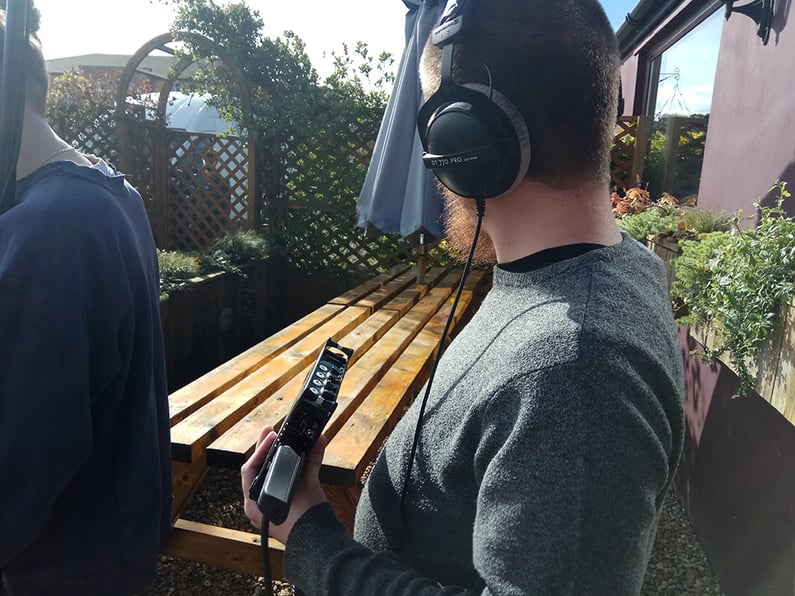About to enter into his final year, Sound for Film and TV student Aaron Kennedy has already edited the dialogue for an independent feature film. We caught up with him to find out a bit more about this oft-overlooked aspect of post-production.
Like many members of our community, Aaron Kennedy’s relationship with dBs Music stretches back a long way. After coming to study with us in Plymouth post-GCSE, it was not until later in life that he discovered the path he really wanted to pursue.
“I was 25 and wondering what to do with my life. I had worked a bunch of different jobs in retail and service but I never really felt happy in what I was doing. Then I saw that dBs was offering the Sound for Film and TV course in Bristol and I just thought – why did I not think of this before? It was so obviously the right answer. I have always had a weird obsession with places where things are filmed. I’ve done road trips to find old filming locations, so I applied for the course hoping to do on-set recording, and eventually become a production sound mixer.”
Whilst on the course, Aaron was offered the opportunity to work on an exciting real-world project – an independent feature film directed by Alex Klaus called The Lost. After initially taking select scenes from the film and using them as a basis to complete individual projects, Aaron was invited to take on the role of dialogue editor for the entire movie. Based on this experience, we sat down with Aaron to discuss the nature of dialogue editing and its understated importance within the world of film.
What is dialogue editing?
“A dialogue editor will take all the production sound (which is the sound recorded on set, the dialogue mostly) and they will clean it and organise it. The aim is to assist the narrative of the film by shaping the sound and giving it its own life.”
What constitutes 'good sounding' dialogue?
“In my eyes, clarity is the main thing. I always think of dialogue editing like CGI. When CGI is good you don’t notice it’s there. It’s the same with dialogue editing – when it’s done well you shouldn’t notice anyone has done anything at all. Most of the time it’s about removing distractions that might break your immersion and remind you that you are watching a film.
“So for example, a lot of people say that the dialogue in Christopher Nolan films is very hard to hear. Sometimes it can be inaudible over the music and sound effects. He does this deliberately and sometimes it works as a creative effect. In Dunkirk for example, all you can hear are gunshots, but this kind of makes sense for a war movie – it makes it ultra-realistic. In other films though, it can be really distracting not to be able to understand what the characters are saying.”
How do you achieve a good dialogue edit?
“It’s really important to keep the levels consistent. So, making sure things don’t jump up and down – that’s distracting in itself. I would spend a lot of time getting rid of background noise – the rumbles from a nearby road, the squeaks. Maybe the sounds of the film set down don’t fit the scene you are creating. For example, if you are shooting a scene in a post-apocalyptic film and there are birds in the background you need to clear that up.
“As well as clearing up the dialogue you need to give it life. If there are some lines that sound flat, you might need to boost the mid frequencies, or maybe there is too much low end cutting that off. If can be unrealistic if you have a character that is ten meters away but has a lot of low frequencies in their dialogue, it’s not realistic. It’s about making sure it all blends in and feels natural.
“Also sometimes cuts change and you have to t do what’s called conforming. That’s taking all your work and syncing it up with a new cut, making sure it lines up with the new length of the footage.”
What are the top three things you’ve learnt from your experience working as a dialogue editor?
“Firstly, how much work goes into it. It can take weeks and weeks to do a feature and even more if the cut changes and you have to conform.
“Secondly, how understated it is. I was explaining the gist of dialogue editing to my mum and she was saying she thought that with every film and tv show, you just film it and that’s the sound. She had no concept of post-production. But without any of that stuff, the film falls apart.
“Lastly, how much fun it is to do. Even when you have a horrible line that’s filled with an awful noise. When you spend 20 minutes on it and hear it sound as it should it’s so satisfying!”

His experience working on The Lost is just the beginning of what is set to be an exciting career for Aaron, who already has a number of other projects in the pipeline. In October he will be working on the production and on-set recording for two short films by local student directors. Later this year, he will also be providing the post-production for a full-length Canadian feature film, alongside fellow dBs student George Ramsden.

